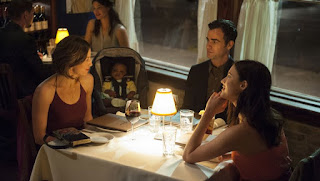A Return to Grief and Loss
"I understand the pull. I understand that your family and your past, I understand that going back to them feels comfortable and easy, because the alternative, what we do is very, very hard. But there can't be any doubt Laurie. Because doubt is fire. And fire is going to burn you up. Until you are but ash." — Patti, "The Leftovers"
My wife sometimes jokes that I like to watch some weird and depressing things. I guess that's true. I'm fascinated by a lot of different kinds of story. I think stories have power, and represent bigger issues their creators want to explore. Weird and depressing stories can have value that way.
But there is probably nothing on TV that prepared me for "The Leftovers," an HBO drama based on the novel by Tom Perrotta and adapted by Damon Lindelof, who was an executive producer on "LOST." It debuted last summer, and the first season encapsulated the action of the novel. And it was often an incredibly rough watch.
That explains the middling ratings and the large number of people who just couldn't stick with the show. That's understandable. No matter how good a drama is, if it's brutal to watch and mired in a deep depression, no one wants to spend their Sunday night bathing in it. At least not most people.
I can't say I loved "The Leftovers," but I was fascinated by the way it meditated in this place of grief, loss and confusion. I devoured the 10 episodes and bought the book over the summer, finishing it in a week. It wasn't a feel good experience, but it was fascinating to read and think about.
Surprisingly, HBO renewed "The Leftovers" for a second season. And Lindelof made some changes — a necessity since his source material was expended — and set the show for a release this fall. After two episodes, it's clear that for all that's changed, the weird, grief-stricken feel of the show remains.
Our heroes — Kevin (Justin Theroux) and Nora (Carrie Coon) — have fled Mapelton, New York for a small town in Texas that was unaffected by the disappearance of two million people. The small town has become a mecca for people to come and be and, in a large sense, worship. But it's not a perfect place and, soon after our heroes arrival, it seems to be touched by that sense of loss that afflicted everywhere else in the world.
"The Leftovers" remains frustrating for its lack of explanation, too. In fact, the second season began with a protracted sequence showing a cavewoman give birth, struggle with the brutality of the world and, I believe, die. The fact I can't say she died with certainty is a product of the ridiculous construct of this series. In fact, the premier episode only briefly featured our central characters. That's a bold risk for a show that struggled to connect with an audience.
But, again, that's what makes it fascinating to me. It's not great, it's not easy to watch, and I'm not always sure I know what's happening. But I'm oddly compelled. Welcome to the world of "The Leftovers."




Comments
Post a Comment